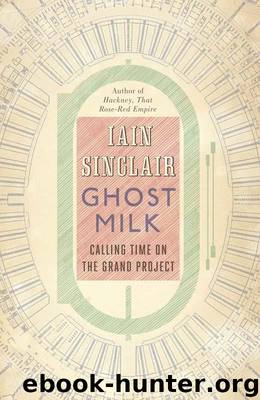Ghost Milk: Calling Time on the Grand Project by Sinclair Iain

Author:Sinclair, Iain [Sinclair, Iain]
Language: eng
Format: mobi, epub
ISBN: 9780141902623
Publisher: Penguin UK
Published: 2011-07-06T16:00:00+00:00
Upstream Pavilions
It was the Chinese hour. Before joggers, cyclists. Coming from a distance, along the river path, an intermittent plosive puffing; breath under pressure, arms pumping across chest. Powww, pwah. Poww. A low-slung concentrated woman, in Mao cap, sees us, sees through us, with no recognition or acknowledgement. None required. My groans, involuntary, are memory-provoked; painful scenes from the past replayed and re-edited as we walk. Every step highlighting an episode best forgotten.
‘Don’t do that.’
I wince, but say nothing, as Anna mutters loudly against dog people who do not scoop, litter bandits shedding packets as they gargle on morning phones. Dogs stimulate conversation. Dogs are sociable; while they sniff rears, lick bollocks, frisk and bound, leash-holders exchange canine gossip. We slalom through twisted cones of unbagged shit.
Chinese walkers pick their circuits with care, paths around stadiums, approved stretches of the river. They never pause. They do not rush: fit for purpose. Exercise undertaken before these unresolved strips of waterside London are visibly empty, witnessed only by cameras and security guards in kiosks.
We are headed for Oxford. The source of the Thames, beyond that, was a sort of coda, to be investigated, but of no great consequence. Oxford is the alternative capital; when London falls, royalty retreats upstream. Charles I and his louche court made free of the medieval colleges. Hitler left Oxford well alone, not a bomb fell, even on the industrial car-making suburbs. He planned to take up residence in the area, slighting Churchill by establishing his headquarters within a few miles of the old bulldog’s birthplace, Blenheim Palace. Oxford is where the brown Thames meets the causeway of oolitic limestone, running from Bath to Stamford: honey-trail and honeytrap.
Within my own peculiar mythology, Oxford was the outer rim of London, the rind, the river-gate: as defined by Ford Madox Ford in his 1909 essay, ‘The Future in London’ – one sixty-mile sweep of the compass-pencil from a fixed point in Threadneedle Street. The arcane, the hermetic: they pushed against the flow, or went with the tide, to this other capital, the city of secret streams, privileged institutions, chained libraries. Capital of spooks and code-breakers. Established drunks and gluttons for preferment. The operators of television’s Morse franchise got it right, time unravels at a gentler pace among inward-facing architecture, enclosed gardens protected by narrow doors.
Elias Ashmole carries off, by cart, the books and artefacts of the Lambeth gardener John Tradescant. He founds a museum in Oxford. Giordano Bruno lectures on the new cosmology and is pronounced a heretic. Oxford, I suspect, will hold some clue, now as always, about the interpretation of England as an argument between poetry (spontaneity, intensity) and politics (the rest). I come back to Ed Dorn and his six-part poem from The North Atlantic Turbine; how aspiration flows west, by train or by water, in the temper of sexualized attention. Riding out of Paddington, watching the soft countryside of the Thames Valley, he sits among the long-haired love-children of a dying imperialism. The eros of water-light plays on golden girls and golden stone: ‘the beautiful Jurassic lias’.
Download
Ghost Milk: Calling Time on the Grand Project by Sinclair Iain.epub
This site does not store any files on its server. We only index and link to content provided by other sites. Please contact the content providers to delete copyright contents if any and email us, we'll remove relevant links or contents immediately.
Cecilia; Or, Memoirs of an Heiress — Volume 2 by Fanny Burney(31939)
Cecilia; Or, Memoirs of an Heiress — Volume 3 by Fanny Burney(31928)
Fanny Burney by Claire Harman(26593)
We're Going to Need More Wine by Gabrielle Union(19033)
Plagued by Fire by Paul Hendrickson(17402)
All the Missing Girls by Megan Miranda(15941)
Cat's cradle by Kurt Vonnegut(15330)
Bombshells: Glamour Girls of a Lifetime by Sullivan Steve(14050)
For the Love of Europe by Rick Steves(13890)
Leonardo da Vinci by Walter Isaacson(13315)
4 3 2 1: A Novel by Paul Auster(12369)
The remains of the day by Kazuo Ishiguro(8969)
Adultolescence by Gabbie Hanna(8917)
Note to Self by Connor Franta(7663)
Diary of a Player by Brad Paisley(7557)
Giovanni's Room by James Baldwin(7320)
What Does This Button Do? by Bruce Dickinson(6194)
Ego Is the Enemy by Ryan Holiday(5412)
Born a Crime by Trevor Noah(5371)
